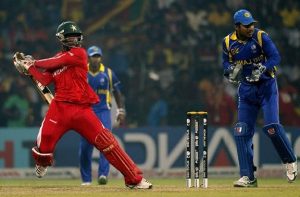“The Lowest Score in One Day Cricket” One Day International (ODI) cricket has seen numerous memorable moments, both of triumph and failure.

Among these moments, the record for the lowest score in an ODI match stands out as a significant marker of an unfortunate day on the field. This record, held by Zimbabwe, is a stark reminder of how unpredictable and challenging the sport can be.
Zimbabwe’s Infamous Record
The lowest score in One Day International cricket is 35 runs, set by Zimbabwe against Sri Lanka on April 25, 2004, at Harare Sports Club. This record-breaking collapse was a result of a combination of exceptional bowling by Sri Lanka and a dismal batting performance by Zimbabwe.
The match lowest score in one day cricket ended in a one-sided affair, with Sri Lanka chasing down the target with ease, further highlighting the lopsided nature of the game.
The Match Context
Going into the match, both teams were in contrasting form. Sri Lanka, led by Marvan Atapattu, boasted a strong squad with experienced players like Sanath Jayasuriya, Mahela Jayawardene, and Chaminda Vaas. On the other hand, Zimbabwe was struggling with internal issues, including player disputes and administrative problems, which had an evident impact on their performance.
Batting first, Zimbabwe faced an immediate onslaught from Sri Lanka’s bowlers. Chaminda Vaas, known for his swing and seam movement, exploited the early morning conditions perfectly. His opening spell dismantled Zimbabwe’s top order, setting the tone for what was to come.
Vaas was well-supported by the rest of the bowling attack, lowest score in one day cricket with Farveez Maharoof and Dilhara Fernando contributing to the wicket-taking spree.
The Collapse
Zimbabwe’s innings lasted just 18 overs, with only one batsman, Dion Ebrahim, reaching double figures (12 runs). The rest of the lineup crumbled under the pressure, unable to counter the disciplined and aggressive bowling from the Sri Lankans.
Chaminda Vaas ended with figures of 4 wickets for 12 runs, while Maharoof and Fernando took 3 wickets each. The lack of application and poor shot selection by Zimbabwe’s batsmen was evident, as they failed to build any substantial partnerships.
The Harare pitch, while offering some assistance to the bowlers, did not justify such a catastrophic batting collapse. It was a combination of excellent bowling, poor shot selection, and perhaps the psychological pressure of facing a superior team that led to Zimbabwe’s downfall.
The Lowest Score in One Day Cricket

Reaction and Aftermath
The cricketing world was stunned by Zimbabwe’s performance. Such a low score in an ODI match is a rare occurrence and often a cause for introspection within the team. For Zimbabwe, this match highlighted the deep-rooted issues within their lowest score in one day cricket cricketing structure.
The administration and coaching staff had to reassess their strategies and address the internal problems that were affecting the team’s morale and performance.
Sri Lanka, on the other hand, received accolades for their dominant performance. The comprehensive nature of their victory demonstrated their prowess and depth in the bowling department. This match was a testament to their ability to exploit weaknesses in the opposition and execute their game plan with precision.
Comparisons and Historical Context
While Zimbabwe’s 35 all out remains the lowest score in ODI cricket, it is not an isolated incident in the history of the game. Low scores have been recorded at various times, reflecting the challenges teams face in different conditions and against quality bowling attacks.
For instance, Canada was bowled out for 36 runs by Sri Lanka in the 2003 ICC Cricket World Cup, just a year before Zimbabwe’s record. These instances lowest score in one day cricket underline the unpredictability of cricket, where even well-established teams can falter on their day.
The low scores are often a result of exceptional bowling, poor batting, or a combination of both, and they add to the rich tapestry of cricket’s history.
Learning from the Past
For cricket teams, learning from such debacles is crucial. It involves not only addressing technical flaws but also building mental resilience. Teams need to develop strategies to handle pressure situations better, improve their adaptability to different conditions, and foster a strong team spirit to overcome adversities.
Zimbabwe’s record low score serves as a case study for cricket lowest score in one day cricket analysts and coaches. It highlights the importance of preparation, mental toughness, and the ability to stay focused under pressure. While it stands as a record of infamy, it also provides valuable lessons for teams worldwide.
Franchise cricket experience in Super Over Success